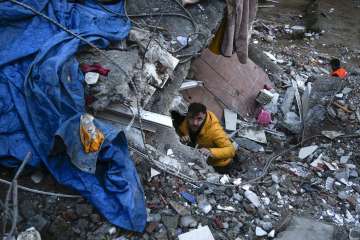Turkey, Syria witness most devastating earthquake in century as thousands killed; rescue underway
The Turkish citizens witnessed three other powerful tremors on Monday, with authorities warning people to be cautious for more aftershocks.

Turkey-Syria earthquake: A powerful earthquake of 7.8 magnitudes hit southern Turkey and northern Syria early Monday, resulting in the killing of more than 2,500 people. According to the Turkish government, the death toll was likely to increase as rescuers continue to look for survivors amid the rubble of collapsed buildings. Subsequently, the country declared seven days of national mourning.
The citizens witnessed three other powerful tremors on Monday, with authorities warning people to be cautious for more aftershocks. The rescue workers are currently sawing away slabs and pulling out bodies as desperate families waited for news on trapped loved ones.
“My grandson is 1 1/2 years old. Please help them, please. We can’t hear them or gotten any news from them since morning. Please, they were on the 12th floor,” Imran Bahur wept at her destroyed apartment building in the Turkish city of Adana. Her daughter and family were still not found.
The quake, which was centred on Turkey’s southeastern province of Kahramanmaras, sent residents of Damascus and Beirut rushing into the street and was felt as far away as Cairo.
Meanwhile, in a video address, Turkish Vice President Fuat Oktay claimed such a disaster could hit “once in a hundred years.” While Turkish President Recep Tayyip Erdogan ascertained the death toll could reach more than 3,000 as rescuers fished out the bodies of the victims.
India sends assistance to the quake-hit country
As the devastating news broke out, Prime Minister Narendra Modi condoled the loss of lives and assured Istanbul to assist in the difficult times. "India is ready to offer all possible assistance to help it cope with this tragedy," he said.
"Anguished by the loss of lives and damage of property due to the Earthquake in Turkey. Condolences to the bereaved families. May the injured recover soon," Modi said in a tweet. "India stands in solidarity with the people of Turkey and is ready to offer all possible assistance to cope with this tragedy," the prime minister said tagging a tweet by Turkish President Recep Tayyip Erdoğan on the quake.
Why Turkey is prone to earthquakes?
An earthquake usually depends on geographical settings and the movement of tectonic plates. In case of Turkey, it is located mainly on the Anatolian Peninsula in Western Asia.
The region sits on top of major fault lines and is considered the most earthquake-prone country in the world. The region is located on the Anatolian tectonic plate which comprises three major tectonic plates-- African, Arabian and Eurasian.
According to Seismicity of Turkey and Real-Time Seismology Applications in Determining Earthquake Hazard, the Turkish/Anatolian plate is surrounded by African and Arabian plates in the south, the Eurasian plate in the north and the Aegean plate in the west. Relative motions between the African, Arabian and Eurasian plates account for most of the tectonic activity in the region. As a result, the Anatolian plate has a high danger of seismicity.
History of deadly earthquakesIn December of 1939, the country had witnessed a massive earthquake of magnitude-8.0 that struck near the eastern city of Erzincan. According to media reports, the strong quake is believed to be the second-most powerful tremor in the country. As per reports, more than 20,000 people were killed and nearly 1,20,000 buildings were damaged.
After the massive destruction, it had witnessed another five disasters between 1942 to 1967. However, on the ill-fated day of 17 August 1999, a 7.4-strong quake struck close to the northeastern city of Izmit, killing more than 18,000 people and leaving more than 2.5 lakh people homeless. In 2011, another strong quake killed more than 130 people in the country.